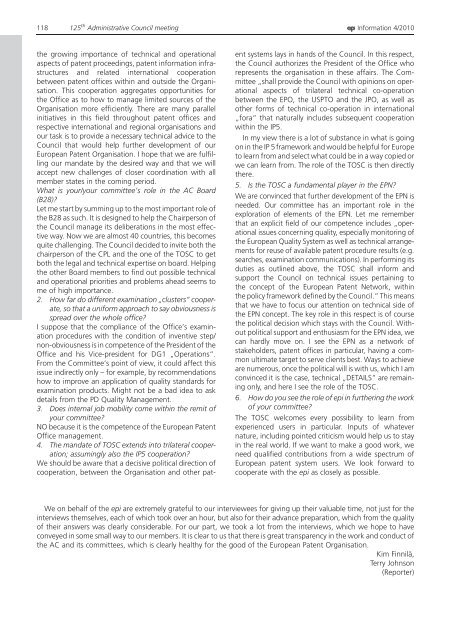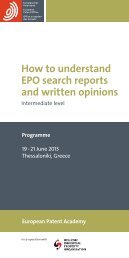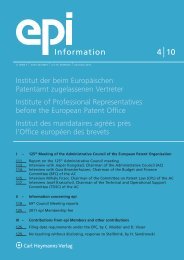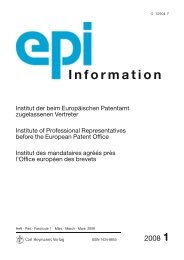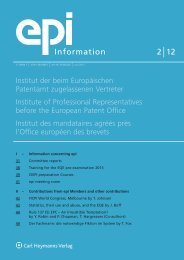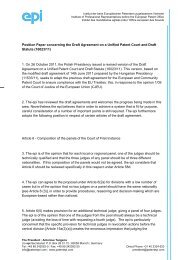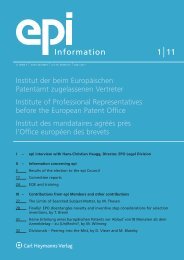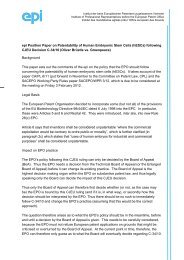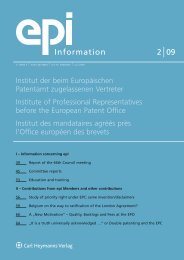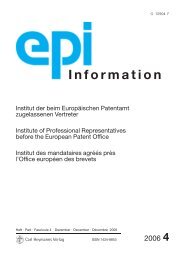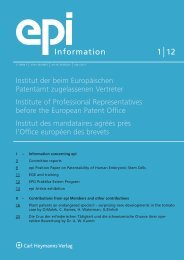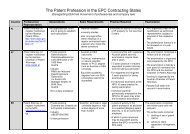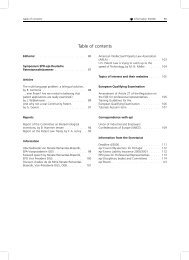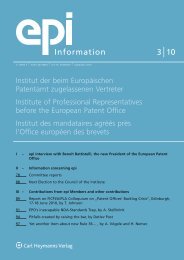4 10 Information - European Patent Institute
4 10 Information - European Patent Institute
4 10 Information - European Patent Institute
Create successful ePaper yourself
Turn your PDF publications into a flip-book with our unique Google optimized e-Paper software.
118 125 th Administrative Council meeting <strong>Information</strong> 4/20<strong>10</strong><br />
the growing importance of technical and operational<br />
aspects of patent proceedings, patent information infrastructures<br />
and related international cooperation<br />
between patent offices within and outside the Organisation.<br />
This cooperation aggregates opportunities for<br />
the Office as to how to manage limited sources of the<br />
Organisation more efficiently. There are many parallel<br />
initiatives in this field throughout patent offices and<br />
respective international and regional organisations and<br />
our task is to provide a necessary technical advice to the<br />
Council that would help further development of our<br />
<strong>European</strong> <strong>Patent</strong> Organisation. I hope that we are fulfilling<br />
our mandate by the desired way and that we will<br />
accept new challenges of closer coordination with all<br />
member states in the coming period.<br />
What is your/your committee’s role in the AC Board<br />
(B28)?<br />
Let me start by summing up to the most important role of<br />
the B28 as such. It is designed to help the Chairperson of<br />
the Council manage its deliberations in the most effective<br />
way. Now we are almost 40 countries, this becomes<br />
quite challenging. The Council decided to invite both the<br />
chairperson of the CPL and the one of the TOSC to get<br />
both the legal and technical expertise on board. Helping<br />
the other Board members to find out possible technical<br />
and operational priorities and problems ahead seems to<br />
me of high importance.<br />
2. How far do different examination „clusters“ cooperate,<br />
so that a uniform approach to say obviousness is<br />
spread over the whole office?<br />
I suppose that the compliance of the Office’s examination<br />
procedures with the condition of inventive step/<br />
non-obviousness is in competence of the President of the<br />
Office and his Vice-president for DG1 „Operations“.<br />
From the Committee’s point of view, it could affect this<br />
issue indirectly only – for example, by recommendations<br />
how to improve an application of quality standards for<br />
examination products. Might not be a bad idea to ask<br />
details from the PD Quality Management.<br />
3. Does internal job mobility come within the remit of<br />
your committee?<br />
NO because it is the competence of the <strong>European</strong> <strong>Patent</strong><br />
Office management.<br />
4. The mandate of TOSC extends into trilateral cooperation;<br />
assumingly also the IP5 cooperation?<br />
We should be aware that a decisive political direction of<br />
cooperation, between the Organisation and other pat-<br />
ent systems lays in hands of the Council. In this respect,<br />
the Council authorizes the President of the Office who<br />
represents the organisation in these affairs. The Committee<br />
„shall provide the Council with opinions on operational<br />
aspects of trilateral technical co-operation<br />
between the EPO, the USPTO and the JPO, as well as<br />
other forms of technical co-operation in international<br />
„fora“ that naturally includes subsequent cooperation<br />
within the IP5.<br />
In my view there is a lot of substance in what is going<br />
on in the IP 5framework and would be helpful for Europe<br />
to learn from and select what could be in a way copied or<br />
we can learn from. The role of the TOSC is then directly<br />
there.<br />
5. Is the TOSC a fundamental player in the EPN?<br />
We are convinced that further development of the EPN is<br />
needed. Our committee has an important role in the<br />
exploration of elements of the EPN. Let me remember<br />
that an explicit field of our competence includes „operational<br />
issues concerning quality, especially monitoring of<br />
the <strong>European</strong> Quality System as well as technical arrangements<br />
for reuse of available patent procedure results (e.g.<br />
searches, examination communications). In performing its<br />
duties as outlined above, the TOSC shall inform and<br />
support the Council on technical issues pertaining to<br />
the concept of the <strong>European</strong> <strong>Patent</strong> Network, within<br />
the policy framework defined by the Council.“ This means<br />
that we have to focus our attention on technical side of<br />
the EPN concept. The key role in this respect is of course<br />
the political decision which stays with the Council. Without<br />
political support and enthusiasm for the EPN idea, we<br />
can hardly move on. I see the EPN as a network of<br />
stakeholders, patent offices in particular, having a common<br />
ultimate target to serve clients best. Ways to achieve<br />
are numerous, once the political will is with us, which I am<br />
convinced it is the case, technical „DETAILS“ are remaining<br />
only, and here I see the role of the TOSC.<br />
6. How do you see the role of epi in furthering the work<br />
of your committee?<br />
The TOSC welcomes every possibility to learn from<br />
experienced users in particular. Inputs of whatever<br />
nature, including pointed criticism would help us to stay<br />
in the real world. If we want to make a good work, we<br />
need qualified contributions from a wide spectrum of<br />
<strong>European</strong> patent system users. We look forward to<br />
cooperate with the epi as closely as possible.<br />
We on behalf of the epi are extremely grateful to our interviewees for giving up their valuable time, not just for the<br />
interviews themselves, each of which took over an hour, but also for their advance preparation, which from the quality<br />
of their answers was clearly considerable. For our part, we took a lot from the interviews, which we hope to have<br />
conveyed in some small way to our members. It is clear to us that there is great transparency in the work and conduct of<br />
the AC and its committees, which is clearly healthy for the good of the <strong>European</strong> <strong>Patent</strong> Organisation.<br />
Kim Finnilä,<br />
Terry Johnson<br />
(Reporter)


